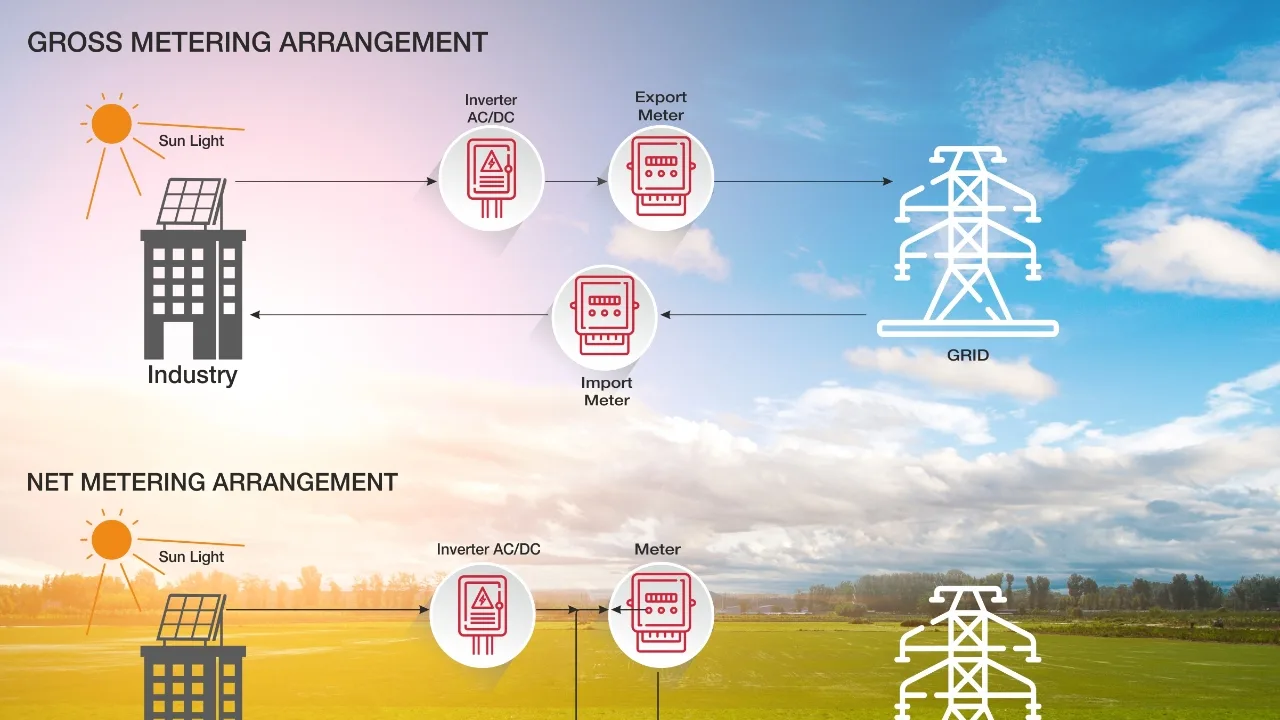Pakistan to End Solar Energy Net Metering, Introduces Gross Metering Policy
In a significant policy shift, Pakistan’s government has announced the termination of the rooftop net metering policy, opting instead for a gross metering system. This change, effective soon, will require solar panel users to sell all the electricity they generate to the grid at a predetermined rate while purchasing their electricity needs from the grid at higher retail prices. The decision aims to stabilize revenue for the national grid and manage electricity distribution more effectively, but it has sparked concerns among residential and small-scale solar producers. Critics argue that the new policy will discourage small-scale solar adoption by making it less financially attractive, ultimately impacting the growth of renewable energy at the grassroots level.
Understanding Solar Energy Net Metering vs. Gross Metering
Net Metering:
Net metering allows solar panel users to offset their electricity consumption by feeding excess electricity back into the grid. Users are billed based on the net energy consumed, calculated as the difference between electricity drawn from the grid and electricity sent back.
Benefits:
Reduces electricity bills significantly.
Encourages users to maximize their solar generation.
Simplifies billing by showing net consumption.
Gross Metering:
Gross metering requires solar panel users to sell all the electricity they generate to the grid at a set rate, while buying all their electricity needs from the grid separately.
Benefits:
Provides a stable and predictable revenue stream from generated electricity.
Simplifies grid management by ensuring all generated electricity is fed directly into the grid.
Attracts larger investments due to clear financial returns.
Why Pakistan is Implementing Gross Metering:
1. Revenue Generation:
Gross metering ensures a stable income for solar producers through fixed feed-in tariffs, making financial planning easier. This method also allows the government to better regulate and tax the generated electricity, providing a steady source of revenue.
2. Grid Management and Stability:
Gross metering simplifies grid management as all generated electricity is fed directly into the grid, avoiding the complexities of net metering systems where bi-directional flow can complicate grid balancing. This helps in maintaining a more consistent and manageable flow of electricity into the grid, ensuring stability and reliability.
3. Encouraging Large-Scale Solar Adoption:
Gross metering is particularly attractive for large-scale solar projects and commercial producers, encouraging more significant investments in the solar sector. Clear financial returns make it easier for investors to calculate payback periods and returns on investment.
4. Economic Considerations:
Gross metering reduces the subsidy burden on the government. Net metering often involves subsidizing the cost of electricity for residential consumers, which can strain government finances. It also allows for better structuring of tariffs and financial incentives, making the solar market more attractive to investors and large-scale producers.
5. Encouraging Technological Advancements:
Gross metering can drive technological advancements and efficiency improvements as producers aim to maximize their generation and revenue. It also promotes the development of technologies that aid in better grid integration and management of renewable energy sources.
6. Policy and Regulatory Environment:
Gross metering policies are often simpler to implement and regulate, reducing administrative and regulatory burdens. This approach aligns with broader national energy policies aimed at increasing renewable energy capacity and reducing reliance on imported fuels.
The Recent Tariff Controversy
The shift towards gross metering has not been without controversy. Recent changes in solar energy tariffs have sparked concerns among residential solar users and small-scale producers who benefit more from net metering. Critics argue that the new tariffs could disincentivize smaller solar installations and favor large commercial producers, potentially slowing down the adoption rate of solar energy at the grassroots level.
Supporters of the gross metering policy, however, point out that it is necessary for the long-term sustainability and growth of Pakistan’s renewable energy sector. They argue that gross metering ensures more predictable financial returns and better grid stability, which are crucial for large-scale investment and development in the solar industry.
The Government of Pakistan’s decision to implement gross metering over net metering is a strategic move aimed at ensuring stable revenue streams, simplifying grid management, and encouraging large-scale solar investments. While the recent tariff changes have sparked debate, the shift towards gross metering aligns with national energy strategies that prioritize economic viability and sustainable growth in the renewable energy sector. As Pakistan navigates its energy challenges, gross metering represents a policy designed to foster a more resilient and investment-friendly environment for solar energy development.

